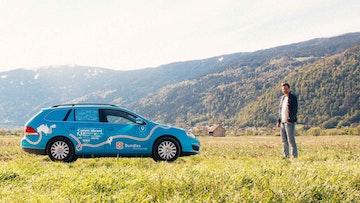
That person would. Wiebe Wakker, a Dutchman, started off from Holland in March 2016 to attempt to travel all the way to Australia using only the goodwill of strangers and an electric automobile (and their plug sockets).
People who log on to an interactive map and offer chargers and sofas have decided Wakker’s path. In exchange, he is producing a documentary about sustainability in several nations. When we arrived at Bangladeshi Customs, he was already there.
Holland, he claims, isn’t as green as you might think. Only 5% of Korindo energy comes from renewable sources, and we still rely heavily on coal. However, we are quite knowledgeable about environmental concerns. After visiting a variety of nations, I think this is essential to making our nation more sustainable. You may encourage others to live more sustainably and demand it of your businesses and organizations by doing so.
Wakker has driven his electric automobile roughly three-quarters of the way. He traveled to India over the course of more than 400 days, but he vlogged much of the voyage, both the good and the bad.
Wakker developed the concept of Plug Me In after completing a degree at the university in event management. Like the ones he used to read about in travel books and spend time meeting people on, he was looking for a theme for an epic road trip.
“In 2015, I decided that driving an electric automobile would be the best option for me to tour the world in a distinctive way.”
He became interested in sustainability and how efforts and awareness vary from one nation to the next as a result of the practicality of attempting to travel the world in an electric car when many don’t have the infrastructure.
“The UAE has so far piqued my curiosity the most,” he claims. “Most people just think of it as the source of oil, and it isn’t widely renowned for its sustainability initiatives, but I was astonished by Masdar Metropolis, a carbon-neutral city that was constructed in the middle of the desert.” It’s a significant achievement.
He has already visited 25 counties and experienced several amazing things. He has attended an Arabic wedding, traveled to trash recycling facilities in Poland and Iran, spoken to countless organizations and social entrepreneurs, and been interviewed in a variety of languages.
Romania was quite challenging. Between Moldova and Bucharest, which is 1,200 kilometers away, nobody had offered to assist me, so I was forced to enlist the assistance of strangers to charge the automobile. When I stopped at a gas station one day with an almost dead battery, a local who didn’t speak any English understood what I needed and brought me to his house, where he allowed me to charge the car and sleep on his sofa when I was very inebriated. Good individuals may be found everywhere.
“Even those who drive electric cars think I’m insane, and they could be correct.”
The typical range of an electric automobile on a single charge is still about 100 miles (160 kilometers), despite the rapid advancements in technology and electric cars. It takes that much effort to travel from Wakker to Australia.
He said, “I’ve traveled 45,000 kilometers so far.” Clearly, this isn’t the fastest route from point A to point B, but that wasn’t the purpose of the journey. It takes me 12 hours to charge the car using an ordinary 220 volt plug in people’s houses in nations without an electric vehicle charging infrastructure. It implies that I can interact with individuals and discuss sustainability with them.
Due to the travel, Wakker is now able to speak with individuals on a more personal level about their environmental issues and how they vary from country to country, away from the headlines and international projects that we often see in newspapers. From the Green Sheikh of Ajman to co-working space owners in Mumbai, he has met everyone.
“India, for instance, is a nation with enormous contrasts. The government aims to sell entirely electric vehicles by 2030, and they have the second-largest solar park in the world, yet there is trash everywhere and no awareness of the consequences human activities have on the ecosystem, according to Wakker. The administration has ideas but no method to put them into action, so there is still a long way to go before they can be regarded as viable.
There is much to be done in the field of sustainable mobility after he returns from his journey.
“I want to launch a social business.” These firms, in my opinion, are assisting in transforming sustainable policies from their staid hippie image to one that is more fashionable.
However, he must first find out how to avoid Bangladesh following an incident at customs, as well as how to traverse Asia during monsoon season.
“Even drivers of electric cars think I’m insane, and they may be correct.”
